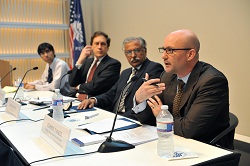Seeking a Silver Bullet: Key Challenges in India-Pakistan Normalization
On May 26, USIP hosted a panel discussion examining the three main obstacles to normalization of India-Pakistan relations, and the road ahead for India and Pakistan.
Read the event coverage, Palestinian Delegation Visits USIP
India and Pakistan have resumed dialogue after a prolonged hiatus. Given the importance of normalization between these two nuclear powers, this is a positive development. India and  Pakistan's last attempt at rapprochement, the Composite Dialogue, managed to make make substantial progress on key outstanding issues, but fell apart in the wake of the November 2008 Mumbai attacks. The stakes are even higher as the two sides come together again to resolve their differences. Three major stumbling blocks to normalization are repeatedly highlighted: terrorism originating from Pakistani soil; the longstanding dispute over Jammu and Kashmir; and each country's respective role in Afghanistan.
Pakistan's last attempt at rapprochement, the Composite Dialogue, managed to make make substantial progress on key outstanding issues, but fell apart in the wake of the November 2008 Mumbai attacks. The stakes are even higher as the two sides come together again to resolve their differences. Three major stumbling blocks to normalization are repeatedly highlighted: terrorism originating from Pakistani soil; the longstanding dispute over Jammu and Kashmir; and each country's respective role in Afghanistan.
To examine these three challenges and the road ahead for India and Pakistan, USIP hosted a panel discussion on May 26, 2011.
Speakers
- Amb. Karl Inderfurth
Senior Adviser and Wadhwani Chair in U.S.-India Policy Studies, Center for Strategic and International Studies; and
former Assistant Secretary of State for South Asian Affairs - Tariq Parvez
former Chairman of the National Counter Terrorism Authority, Pakistan; and
former Director General, Federal Investigation Agency, Pakistan - Stephen Tankel
Associate Fellow at the International Centre for the Study of Radicalisation and Political Violence; and
Visiting Scholar, South Asia Program, Carnegie Endowment for International Peace - Moeed Yusuf, moderator
South Asia Adviser, U.S. Institute of Peace
Explore Further
- Learn more about USIP's work in Pakistan
- Read the Special Report, "Hydropolitics in Pakistan's Indus River Basin"USIP Center for Conflict Analysis and Prevention



